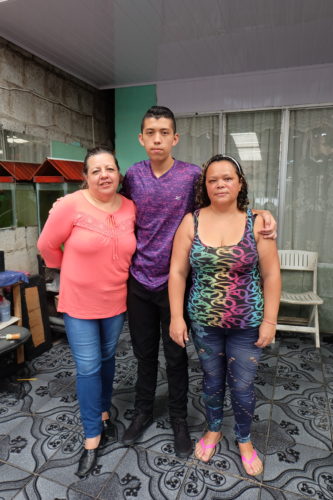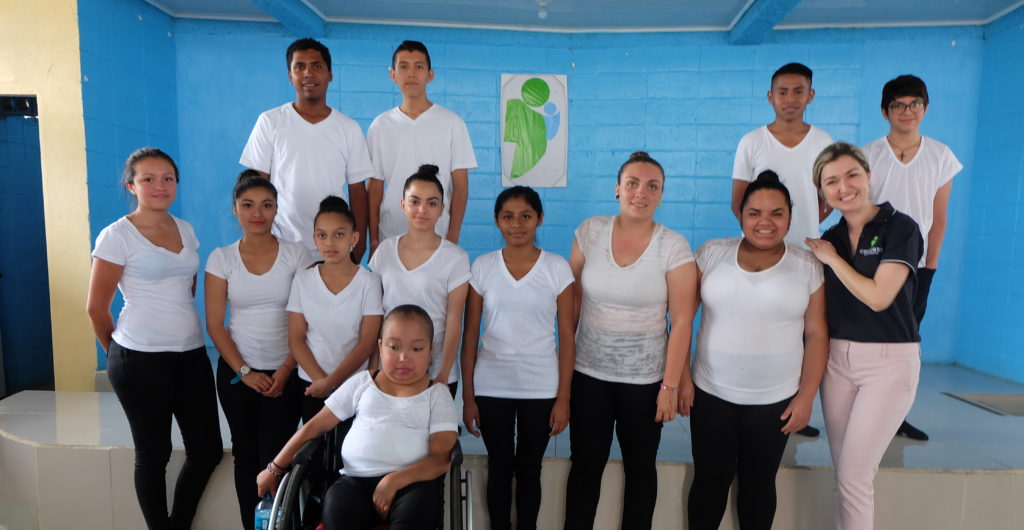When we first met our volunteer coordinator, Marta, at the Costa Rica Center in San Jose, I could tell she was full of energy. A small Costa Rican woman, she walked quickly down the sidewalk away from our hotel, as Andreia, our International Site Specialist, and I tried to keep up. When we got to her car, she shuffled us in, having a busy agenda for the day.

Ricky, Marta (left), and Ricky’s mom, outside of their home
In the morning, we would be visiting the houses of four of our sponsored children, and then we would be meeting the eighteen children enrolled in our program at the community center, which Marta uses as their monthly meeting spot. There, the mothers and the children had something special planned for us.
A Second Mother
The Costa Rica Center has been a Children Incorporated affiliate site for more than thirty years. Our founder, Mrs. Jeanne Clarke Wood, originally started working with this place when it was an orphanage. At that time, it had a school attached to it, which Marta’s son, who is now grown, attended. Marta worked as a volunteer with our former coordinator at the school, and eventually took over for her. She has been our coordinator at the Costa Rica Center for twenty years now.
Today, the orphanage is no longer there, and Marta has found another location at which to meet with the children in our program. Our program could have disappeared with the closing of the orphanage and the school, but instead, Marta happily took over all the responsibilities that go along with sponsorship, acting in many ways as a second mother to these children, which she isn’t really far from.
She has seen many of the children grow up in our sponsorship program, having been enrolled in primary school, and going on to graduate. A lot of the children have been in the program for ten years or more, which says a lot about Marta. She has used her abundance of energy to help keep these kids in school for many years.
The Importance of Longevity
Marta happily took over all the responsibilities that go along with sponsorship, acting in many ways as a second mother to these children, which she isn’t really far from.
All the Costa Rica Center children live in the city of San Jose, in various impoverished neighborhoods, and they attend the local schools. Many of them are in high school, or are just graduating and moving on to college or trade school. I was so impressed with Marta — her personal dedication to helping these kids was amazing, and the fact that so many older children, mostly between the ages of fourteen and eighteen, are enrolled shows me that she understands the importance of longevity when it comes to sponsorship.
Keeping children in the program as long as possible, and keeping up with their home lives and families is a big job — and Marta is obviously doing it well. She not only meets with the children on a monthly basis to provide them with food baskets, but she also plans holiday and Mother’s Day activities to give the children and their families a chance to get together and celebrate. She also has monthly meetings with the mothers to discuss whatever concerns they may have.
Helping Children Become Teens

Theresa and her mom in their house in San Jose
Our first stop was Ricky’s home, which was a small house down a narrow alleyway in the city. In his early teens, Ricky is a ninth-grader who lives with his parents and two siblings. His mother talked to us about how much sponsorship helps the whole family — with Ricky receiving support, they have less to worry about, and it also motivates Ricky to do well in school so he can stay in the program.
Marta also took us to Theresa’s house. Theresa was born five months prematurely and has had health issues ever since she was an infant. She is now nineteen, has always needed a wheelchair to get around, and has had multiple complications throughout her life that have lead to long stays away from home — sometimes even months — in the hospital. Theresa’s single mother receives very little help from the government to cover health care costs, and the government prevents her from working because she must care for her daughter full-time.
Theresa’s sponsor sends additional gifts to help with her special needs, which has been a great help for the family, who never knows when Theresa might end up back in the hospital — and her sponsor has even visited a few times over the years. As I look around the house, I notice a picture of Theresa on the wall, holding a violin. Her mom told us that one time, when Theresa was hospitalized for four months, the staff there gave the children musical instruments so that they would have something to do. Theresa learned to play while she was recovering, and plays all the time now.
The Joy of Laughter
After our home visits, Marta took us to the community center where she meets with the mothers and children. The center is large, with a stage in front, and benches lining a wall. The mothers all brought homemade dishes for lunch, as well as homemade crafts to show us. Ceramics, paintings, and knitted garments lined a long table that was against a wall. Marta explained that she encourages the mothers to make crafts to sell, so they can earn additional income.
After lunch, the children had a special performance planned for us. They did an interpretive dance, which was very well choreographed, considering these teens do not see each other very often at the center, nor do they live close to one another or attend the same schools. They had taken the time to get together to practice, and it was apparent that they enjoyed being together as a group, because they worked really well as a team.
It was great to see that they have become close – more than friends – over the many years they have had sponsors.
After their performance, Andreia and I spoke with the mothers, while the teenagers sat on the stage and chatted, laughing excitedly, and enjoying the desert their mothers had prepared. I kept getting distracted by their laughter, and my eyes wandered over to them, one different giggling face after another coming into my view.
I love knowing that these children have gotten to know each other because of our program, since they probably wouldn’t have met otherwise. It was great to see that they have become close — more than friends — over the many years they have had sponsors. These teens are like family, with Marta acting as an additional mother in their lives, all supporting each other as they grow up.
***
HOW DO I SPONSOR A CHILD IN COSTA RICA?
You can sponsor a child in Costa Rica one of three ways – call our office and speak with one of our sponsorship specialists at 1-800-538-5381, email us at sponsorship@childrenincorporated.org, or go online to our donation portal, create an account, and search for a child in Costa Rica that is available for sponsorship.

